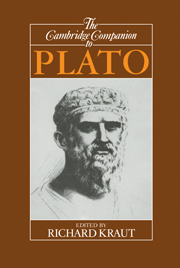Book contents
- Frontmatter
- 1 Introduction to the study of Plato
- 2 Plato
- 3 Stylometry and chronology
- 4 Socrates and the early dialogues
- 5 Mathematical method and philosophical truth
- 6 Inquiry in the Meno
- 7 Plato and Greek religion
- 8 Platonic love
- 9 Plato's metaphysical epistemology
- 10 The defense of justice in Plato's Republic
- 11 Plato on poetic creativity
- 12 Good-bye to the Third Man
- 13 Plato's Sophist on false statements
- 14 Disintegration and restoration
- 15 Plato's later political thought
- Bibliography
- Index
6 - Inquiry in the Meno
Published online by Cambridge University Press: 28 May 2006
- Frontmatter
- 1 Introduction to the study of Plato
- 2 Plato
- 3 Stylometry and chronology
- 4 Socrates and the early dialogues
- 5 Mathematical method and philosophical truth
- 6 Inquiry in the Meno
- 7 Plato and Greek religion
- 8 Platonic love
- 9 Plato's metaphysical epistemology
- 10 The defense of justice in Plato's Republic
- 11 Plato on poetic creativity
- 12 Good-bye to the Third Man
- 13 Plato's Sophist on false statements
- 14 Disintegration and restoration
- 15 Plato's later political thought
- Bibliography
- Index
Summary
In most of the Socratic dialogues, Socrates professes to inquire into some virtue. At the same time, he professes not to know what the virtue in question is. How, then, can he inquire into it? Doesn't he need some knowledge to guide his inquiry? Socrates' disclaimer of knowledge seems to preclude Socratic inquiry. This difficulty must confront any reader of the Socratic dialogues; but one searches them in vain for any explicit statement of the problem or for any explicit solution to it. The Meno, by contrast, both raises it explicitly and proposes a solution.
THE PRIORITY OF KNOWLEDGE WHAT (PKW)
Meno begins the dialogue by asking whether virtue is teachable (70a1-2). Socrates replies that he doesn't know the answer to Meno's question; nor does he at all (to parapan, 71a7) know what virtue is. The latter failure of knowledge explains the former; for “if I do not know what a thing is, how could I know what it is like?” (ho de mē oida ti estin, pōs an hopoion ge ti eideiēn; 71b3-4). Nonetheless, he proposes to inquire with Meno into what virtue is. Here, as in the Socratic dialogues, Socrates both disclaims knowledge and proposes to inquire.
- Type
- Chapter
- Information
- The Cambridge Companion to Plato , pp. 200 - 226Publisher: Cambridge University PressPrint publication year: 1992
- 21
- Cited by

